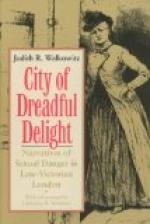“But you have not eaten of my salt,” he declared.
Momus showed interest. It had been long since the last meal in the luxurious house of Costobarus. The boy in the meantime produced unleavened loaves from the carry-all of sheepskin that hung over his shoulders, and without explanation disappeared among his flock. Presently he returned with a small skin of milk.
“We have goats in the flock,” he said. “A shepherd can not live without a goat. You do not know about shepherds,” he added.
Laodice thought that she detected tactful inquiry in his last remark and roused herself painfully to make due explanations to her host. But he waved his hands at her, with the desert-man’s courtesy which covers fine points better than the greater ones.
“Eat my fare; I do not purchase thy history with salt and shelter,” he said, with a certain sublimity of honor.
Momus ate, and looked with growing grace at his young host. But Laodice succeeded only in drinking the goat’s milk and lapsed into benumbed gazing at the red glow of fire that cast its warmth about her. The shepherd talked on, attempting to interest her in something other than her consuming sorrow.
“These be Christian sheep about you, friends,” he said, “and I am a Christian shepherd.”
Momus sat up suddenly with a bit of the boy’s bread arrested on its way to his lips. He was eating the fare of an apostate, of a despised Nazarene. The boy went on composedly.
“We are from Pella, the Christian city. We are, my sheep, my city and I, the only secure people in all Judea. We, I and the sheep, have been in the hills since the first new grass in February. We are many leagues from home.”
“So am I,” Laodice said wearily.
“Jerusalem?” the shepherd asked, glad he had brought out a response. “No? Yet all Judea is going to Jerusalem at this time. Are you fugitives?”
Momus nodded.
“Come then to Pella,” the shepherd urged. “You will be fed there; Titus will not come there. We are poor but we are happy—and we are safe.”
Laodice thanked him so inertly that he sensed her disinterest, and while he sat looking at her, searching his heart for something kind to say, she put out her hand impulsively and took his.
“God keep thee and forget thy heresy,” she said. “If thou livest in Pella, Pella is indeed happy.”
He laughed with a flush stealing up under the brown of his cheeks. A faint light came into Laodice’s eyes as she looked at him; he returned her gaze with a gradual softening that was intensely complimentary. Between the two was effected instant and lasting fellowship. Before Momus’ indignant eyes the shepherd was blushing happily.
“Who art thou?” Laodice asked.
“They call me Joseph, son of Thomas.”
After a silence she said softly,
“I am not at liberty to tell my name.” She remembered the secrecy of Philadelphus’ mission. “Yet perchance if the God of my fathers prosper me and my husband, I may come to Pella—as thy queen.”




